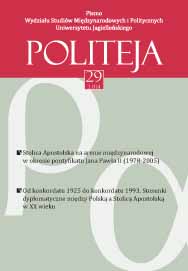Dyplomacja czasów przełomu: Jan Paweł II i kształtowanie się dyplomacji publicznej Stolicy Apostolskiej
The diplomacy of the times of momentous events. John Paul II and the formation of the public diplomacy of the Holy See
Author(s): Krzysztof StrzałkaSubject(s): Politics / Political Sciences
Published by: KSIĘGARNIA AKADEMICKA Sp. z o.o.
Keywords: public diplomacy; Catholic social teaching; international relations; Vatican diplomacy; John Paul II pontificate; pastoral visits; human rights
Summary/Abstract: During the course of the pontificate of the Polish pope and thanks to his efforts and initiative, the Holy See elaborated upon its own holistic formula of the activity of the Church in the international arena. This formula constituted the essence of its influence, its “policy” and “soft power” toward the most important international concerns (the social doctrine of the Church). This formula was also associated with the formation of new ideas concerning international law, especially the right to humanitarian involvement, and it made a significant contribution to the development of human rights in the wide scope of this area of concern: from the right to religious freedom to the right to live. During the course of John Paul II’s pontificate there was a qualitative and unprecedented increase of the prestige of the Holy See in the world which was expressed e.g. in the construction of its position as an important entity by the Holy See. The innovative character of the activity of the Holy See in the international arena during the course of John Paul II’s pontificate consisted above all in the achievement of moral prestige in the world and in the granting of the role of the “conscience of mankind” to the Holy See. Behind this expression lies the essence of the pope’s thinking about social, economic and political concerns. This essence defines the content of the “international policy of the Holy See” and it is referred to as the “social doctrine of the Church”. An in‑depth analysis of the activity of the Holy See in the international sphere during the course of John Paul II’s pontificate furnishes many inspirational examples concerning how considerable influence and great results may be achieved by employing the means of “soft power” and public diplomacy. The means that were widely used by the pope both to present the principles of the social doctrine of the Church and to construct in this way real power and influence were associated mainly with appeals and persuasive speeches delivered publicly to the world, especially during meetings and prayer (general audiences, the Angelus, meetings with young people, world days, meetings with politicians, public appearances in the fora of international organizations, pastoral pilgrimages, the delivery of occasional messages, letters submitted to various professional groups). The actions and interventions of Pope John Paul II in the sphere of international relations were always based on moral and ethical deliberations concerning the questions of social justice and the rights and dignity of man. These concepts lay at the heart of the Catholic social doctrine on which the international policy of the Holy See during the course of this great pontificate was based. Experience and numerous examples prove that wherever his message was accepted, the pastoral mission, presence and effectiveness of delivery could achieve extraordinary results.
Journal: Politeja - Pismo Wydziału Studiów Międzynarodowych i Politycznych Uniwersytetu Jagiellońskiego
- Issue Year: 11/2014
- Issue No: 29
- Page Range: 219-243
- Page Count: 25
- Language: Polish

